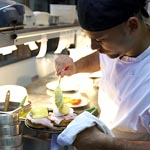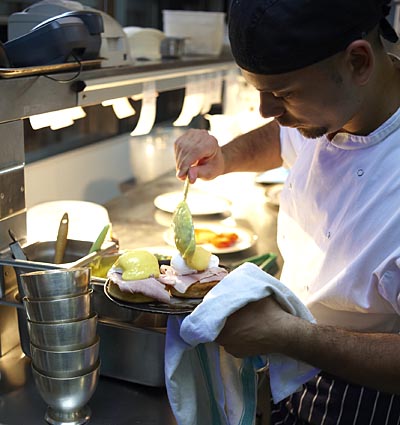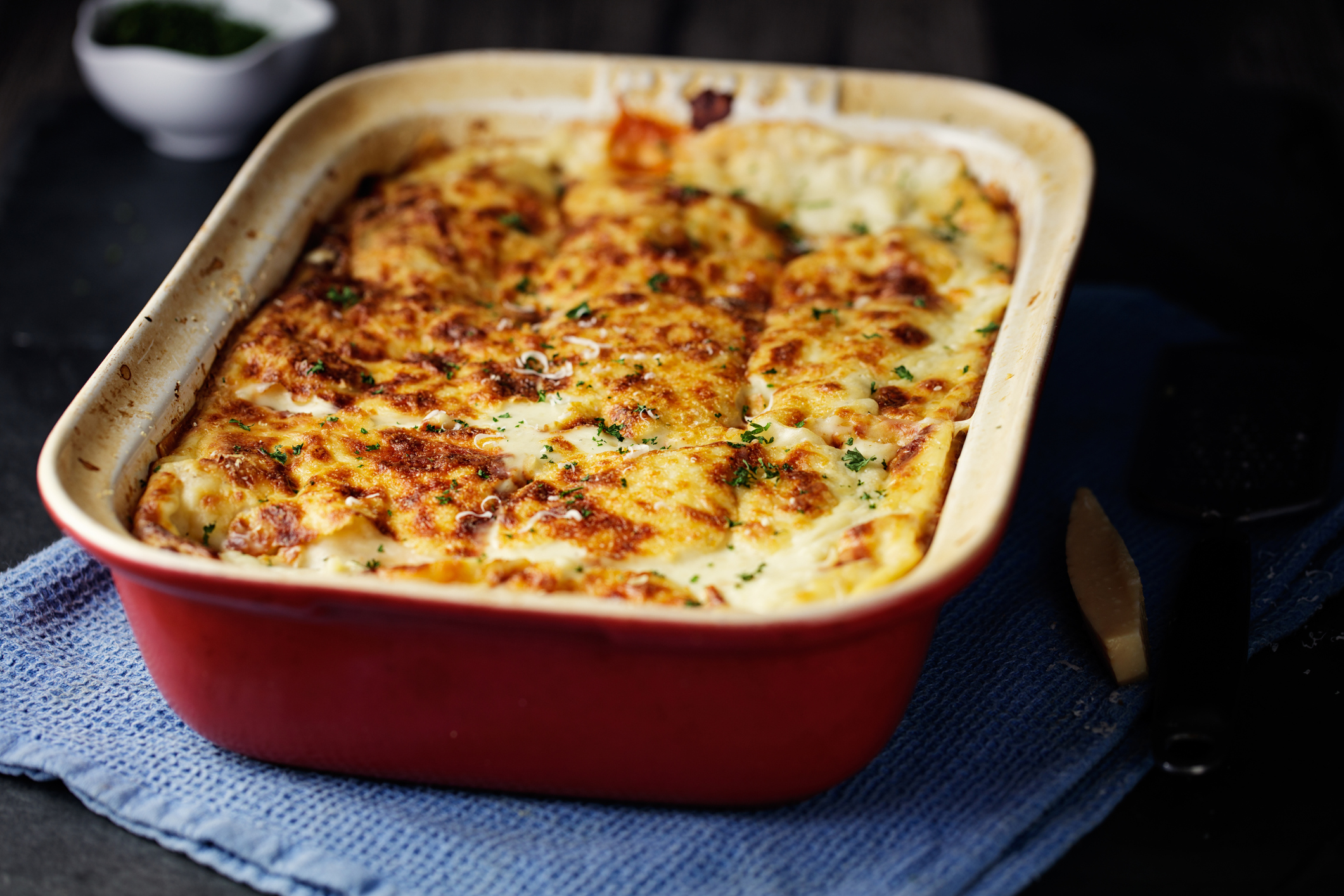A day in the life of the Wolseley
Jonathan Self goes behind the scenes of one of London's institutions, The Wolseley


The ethos of The Wolseley, that grand café in the European tradition-vast, opulent and luxurious-is not one of profit (although I suspect it is highly profitable), but of excellence. It isn't just that The Wolseley is exquisitely fitted out, heavily staffed and uncompromising when it comes to the quality of its food-every tiny detail is of concern. The chefs know the farmer who supplies the free-range duck eggs, the white-satin ribbon used to tie the muslin wrapped around the lemons is subjected to the closest scrutiny, and nothing is bought in (not even marmalade) that could possibly be made on the premises.
It takes 187 members of staff to run the place, and they serve up to 1,300 customers a day. To put this into perspective, The Dorchester serves 1,200, the nearby Ritz 880 and The Savoy 770. The Wolseley is a haunt of the rich and famous, renowned for its cuisine, its service and the splendour of its dining room. And yet, what makes the establishment so impressive is hidden from the public gaze by a discreet black door in the basement. For 24 hours, I had the privilege of finding out exactly what goes on behind it.
Midnight Sujin, the tourier, arrives. She is the risen-pastry maker, and there are very few of them left in professional kitchens. There are some 30 people on duty in the kitchen, and as I'm shown round, everybody shakes my hand. They shake each other's hands, too, whenever they come on and off duty, and sometimes for no apparent reason at all. After doing so, if they're about to handle food, they wash their hands.
1am Sujin is in the pastry kitchen experimenting with ideas for the next directors' tasting. The menu is changed five times a year, to keep it fresh and to take advantage of seasonal produce. The directors have to approve every new item. ‘They are hard to please,' says Sujin. Her three colleagues nod solemnly in agreement. The pastry chefs are friendly and feed me every time I look in on them. I find myself looking in with sur-prising regularity. The cannelés Bordelais are to die for.
2am The night-prep chefs have spread themselves out. In the main kitchen, Zsolt is turning 100lb of chicken necks into stock. Two cleaners are scouring stoves as if their lives depended on it.
3am The floor of the cold-larder section is strewn with boxes of fresh vegetables. One chef is separating salad leaves, another shelling peas, a third stringing beans and a fourth cutting lemons. I shake hands with them. Ritually, they wash. Manuel is the only one inclined to talk. He likes to work nights so he can attend the evening service at his church. He wraps 250 half-lemons in pieces of white muslin and ties them carefully with satin ribbon.
4am Standing at the bottom of the goods lift, we hear a snatch of conversation between two girls on Arlington Street. ‘Do you think I should go home with him?' ‘Well, if you think you're pregnant anyhow...' Manuel shakes his head in disbelief and carries off a tray of artichokes. A voice calls ‘Duck eggs' down the shaft, and the lift descends. ‘These come from a free-range farmer in Kent,' explains Alison, who's in charge of checking the deliveries. About £6,000-worth of perishable ingredients enters the restaurant each day. In the kitchen, Rachael, the chef in charge of breakfast service, has arrived and is telling jokes.
Sign up for the Country Life Newsletter
Exquisite houses, the beauty of Nature, and how to get the most from your life, straight to your inbox.
5am Stuart, one of a pair of maintenance men on night duty, is polishing the brass stair rods in the restaurant. ‘It's not on my list, but they need doing.' The cleaners have finished the floor and are moving the tables back into position. Two men in aprons are bringing out the silverware, which is wrapped in green felt, from the strong room. Outside, a long queue of deliverymen is waiting to use the goods lift.
6am Ben, one of three baristas on duty, is checking the bank of espresso machines, rather in the manner of a pilot running through the pre-takeoff drill. The Wolseley dispenses about 2,000 hot beverages a day, half of them during breakfast. Behind him is a small, framed sign: ‘Body language. Remember, customers can see you.' The waiting staff are receiving a pre-service briefing.
7am At 6.59am, the restaurant looks perfect. The managers, waiters and busboys are standing by their stations. The baristas are giving their machines an extra polish. A chef is arranging jugs of freshly squeezed juice. A housekeeper is placing the (presumably ironed) news-papers into their racks. Everyone whispers, as though they're in church. On the dot of 7am, the doorman swings the huge front doors open and a customer hurries in. The night chefs are leaving, the lunchtime chefs are coming on duty. At 7.06am, the miniature printer above the kitchen pass, which is where the food is plated, chatters into life. Rachael calls out: ‘One English, one Benny, one plain omelette...'
8am Crisis: two poached eggs have been sent back. Adam, one of the managers, materialises. Rachael issues orders for the replacement dish. They foregather over the eggs, poking at them with forks and, eventually, tasting them. ‘Overdone,' they say simultaneously. Rachael's admonition consists of a single word: ‘Chef!' The chef respons-ible looks stricken.
9am Two kitchen porters come through removing dirty pots and pans and replacing them with clean ones. There are four porters washing up, two polishing the silver and glasses and two cleaning the floor.
10am Jeremy King, one of the restaurant's owners, works his way around the kitchen shaking hands, chatting, peering into pots. He's wearing a three-piece suit, but shows no signs of feeling the heat. When he's gone, Darius, who has been on breakfasts for six years, tells me that Jeremy and his business partner, Chris Corbin, have big hearts. Marc, the head chef, takes a call from the fish merchant: he has some beautiful fresh haddock on the way up from Cornwall, is Marc interested? He makes it the fish of the day on tomorrow's menu.
11am Yann, the head pastry chef, is making jam, which he does every other day. ‘It's part of our philosophy of making everything here. If we had the space, we would churn our own butter.' In the cold larder, a chef is preparing the sandwiches for afternoon tea. Marc takes over at the kitchen pass; the breakfast chefs move out of the way, the lunchtime chefs move into place. Rachael goes to the office to write up her report on breakfast.

Midday The sous chef stands on one side of the kitchen pass and a senior chef stands on the other. The sous chef's role is akin to that of a conductor in an orchestra. He calls out the orders, ensures each dish is ready at exactly the right time, monitors the individual stations and checks every plate before loading it into the lift. The senior chef shares these responsibilities and plates the food. At 12.45pm, Marc says: ‘We're about to be clobbered, guys-stand by.'
1pm The printer barely pauses between orders. Marc is unruffled. At one point, he has 33 tables on the go, and yet is able to speak calmly to a supplier about a farm visit, holding the receiver to his chest while he calls out the orders. He seems to be everywhere: plating food, shuffling the paper slips containing the orders, opening the lift doors, speaking into the intercom, tasting, picking things up, putting things down.
2pm It's like a sauna in the kitchen, but Mark isn't perspiring. ‘One frites, rush order. Change this steak, please, it's more raw than rare. I need table four in two minutes, thank you. You think,' he says, turning to me, ‘that it's as busy as it can get, and then it gets busier.' At 2.55pm, the evening chefs arrive. Mark raises his voice so that it can be heard: ‘We're still serving lunch, please clear the kitchen.' The evening chefs vanish.
3pm When I stick my head around the door of housekeeping (there isn't room to fit more of me in), Dorota, the duty housekeeper, is ironing. Behind her are rail upon rail of uniforms. She can tell me how many without having to refer to her register: ‘Today, we have 114 white shirts for men, 97 white shirts for women, 62 brown shirts for men, 122 pairs of...'
4pm The second tasting of the day (the first was mid-morning). Everything on the menu that isn't prepared to order has to be tasted by the most senior chef on duty and however many of the directors are available. The cold larder is particularly busy. A large, oval platter covered with sauces is sent out one minute, a bowl of salad the next, a dish of crème fraîche a little later. As each bearer returns, everyone glances up to see whether anything will have to be adjusted or, horror of horrors, remade. Everything passes muster and the chefs look happy.
5pm During the teatime rush, freshly baked scones are consumed at an average speed of three per minute. The statistics are mind-boggling. Every day, The Wolseley buys 65lb of potatoes just to make the frites, of which 300 portions are sold. Breakages and other losses cost an average of £13,000 a month. In a typical week, the restaurant uses more than 8,000 miniature baguettes. The pastry kitchen produces 70 different items on the early-morning shift alone.
6pm The kitchen takes up the basement, the restaurant (which is double-height) has the ground floor, and above it is a floor of open-plan offices. There are several interview rooms, a kitchen and a classroom. The key feature is a dozen or so computer terminals where the managers and senior chefs write up their daily reports, place orders, make suggestions and stay up to date. At 6.30pm, the room is bustling with activity.
7pm ‘Good evening, The Wolseley, how can I help you?' In a glass-partitioned corner, five members of staff are handling reservations. It takes two weeks of intensive training before anyone is allowed to answer the phone because nothing is scripted, which makes genuine knowledge imperative. Managers take their turn, popping in to help when it gets busy. If appropriate, they will mention the restaurant's policy of encouraging ‘walk-ins': ‘There are two areas of the restaurant where you can't reserve a table, so if you just want to turn up, you could easily find we have space.' On a typical day, the team handles more than 1,000 calls between 9am until just before 8pm.
8pm A tray of caramel éclairs (wonky icing), a platter of roasted chicken (over-flavoured), a steak (overdone) and a bowl of vegetables (too buttery) appear-and disappear in the small, utilitarian staff room. Staff can get drinks, sandwiches and pre-prepared meals, or take pot luck on rejects. Customer complaints received during the previous week have been pinned up on the staff-room noticeboard, along with details of the subsequent investigation and response. A thicker wedge of thank-you notes is stuck beside it.
9pm Ross is reading off the orders at the speed of a racing commentator. An apprentice pastry chef accidentally rests a tray of ice creams under the heat lamps used to keep food from getting cold. ‘Whoa, whoa,' says Ross gently, whipping the tray away. No one raises their voice or swears. In restaurant kitchens, it's traditional to shout ‘backs' at the top of your voice. Here, they trill a low-key, almost musical: ‘Mind your backs, please.' I don't think I've ever witnessed food being prepared in a politer atmosphere, even at home. Especially at home, come to think of it.
10pm The chefs have no way of knowing who the customer is, but, occasionally, a rumour circulates. ‘This sole is for Joanna Lumley.' ‘That lamb is for Melvyn Bragg.'
11pm The restaurant is winding down, but downstairs, service is in full swing. Ross is standing at the pass reading off the orders. ‘Two duck, one liver medium, table seven. These frites are slightly too dark, chef,' he says, dumping two servings into a bin. ‘Sorry,' comes a distant voice. ‘On the way, chef.' At 11.30pm, Ross nips into his office and emails the orders for the following day to the various suppliers. Then the tourier arrives.
The Wolseley, 160, Piccadilly, London W1 (020-7499 6996; www.thewolseley.com)
* Subscribe to Country Life and get our Ipad edition for free
Country Life is unlike any other magazine: the only glossy weekly on the newsstand and the only magazine that has been guest-edited by HRH The King not once, but twice. It is a celebration of modern rural life and all its diverse joys and pleasures — that was first published in Queen Victoria's Diamond Jubilee year. Our eclectic mixture of witty and informative content — from the most up-to-date property news and commentary and a coveted glimpse inside some of the UK's best houses and gardens, to gardening, the arts and interior design, written by experts in their field — still cannot be found in print or online, anywhere else.
-
 'Monolithic, multi-layered and quite, quite magnificent. This was love at first bite': Tom Parker Bowles on his lifelong love affair with lasagne
'Monolithic, multi-layered and quite, quite magnificent. This was love at first bite': Tom Parker Bowles on his lifelong love affair with lasagneAn upwardly mobile spaghetti Bolognese, lasagne al forno, with oozing béchamel and layered meaty magnificence, is a bona fide comfort classic, declares Tom Parker Bowles.
By Tom Parker Bowles
-
 Country houses, cream teas and Baywatch: Country Life Quiz of the Day, April 24, 2025
Country houses, cream teas and Baywatch: Country Life Quiz of the Day, April 24, 2025Thursday's Quiz of the Day asks exactly how popular Baywatch became.
By Toby Keel